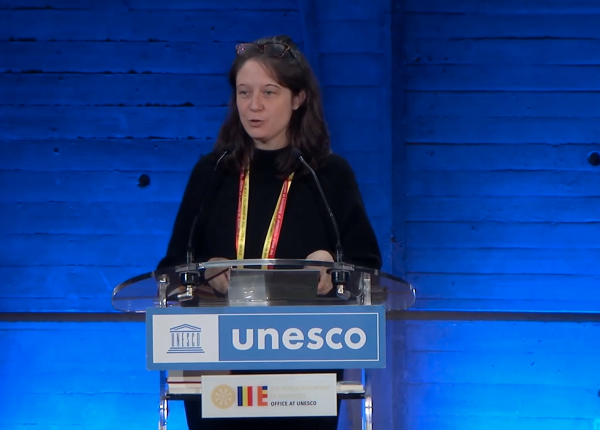“Interfaith education is the way out of extremism,” affirms Bérengère Savelieff, representative of the NGO Interfaith Working Group at UNESCO

As a member of UNESCO’s Interfaith Working Group, New Humanity NGO joins forces with other faith-based NGOs to advocate for peace, justice and intercultural understanding through coordinated efforts within the institution. To learn more about the group’s ongoing work and vision, we spoke with Bérengère Savelieff, who has been closely involved in its coordination.
The Interfaith Working Group at UNESCO brings together Buddhist, Muslim, Christian, Jewish and interfaith-inspired NGOs, all committed to promoting interfaith dialogue as a key strategy for international cooperation and peacebuilding. Created in 2021 in response to rising global tensions and extremism, the initiative closely aligns with UNESCO’s priorities in education, science and culture, offering a space where faith-based voices can contribute to global agendas.
“Interfaith dialogue is a critical tool for achieving peace in a world where religious extremism and fundamentalism threaten unity,” explains Bérengère Savelieff, coordinator of the group and representative of Pax Christi International, one of the nine NGOs that make up the initiative.
The group meets regularly, organizes and participates in high-level roundtables, and engages in advocacy with UNESCO’s sectors and member state delegations. Its aim goes beyond defending freedom of religion: the group seeks to show how shared ethical values across faith traditions can contribute to addressing global challenges such as ecological sustainability, education, ethical technological development and social justice.
“The strength of our group lies in our diversity and shared ethical commitment,” continues Bérengère. For these NGOs, interfaith dialogue is not an end in itself, but a foundation for action. It is through this dialogue that diverse faiths find common ground to act together in response to today’s most pressing challenges.
Watch the video below to learn more about the mission and initiatives of the Interfaith Group:
NGOs at UNESCO
UNESCO currently partners with over 400 NGOs worldwide to strengthen the role of civil society in shaping global policy. These officially recognized organizations contribute across its main fields of action, including education, culture and science.
The presence of these NGOs is essential. As representatives of civil society, they maintain close ties with communities and bring practical experience that complements the work of member states. Their participation reinforces UNESCO’s stated commitment to working with civil society and helps bridge the gap between high-level policymaking and on-the-ground realities.
Yet, despite the urgent need for religious literacy and dialogue in today’s world, interfaith issues are still not systematically recognized in UNESCO’s key documents. Religion is often approached with caution, in part due to the increasingly polarized political climate.
To address this, the group works collaboratively to increase its visibility and political influence within the institution. A central focus of their advocacy is the C/5 document, which outlines UNESCO’s strategic priorities for the next seven years.
“We are advocating for the explicit inclusion of interfaith dialogue within the broader framework of intercultural dialogue,” explains Bérengère. “Although it was included in past years, it has recently been removed due to shifting political contexts. This is the time to reassert its value, because the next opportunity won’t come until 2032.”
Ongoing advocacy
To advance its mission, the Interfaith Working Group engages in diplomatic meetings with state delegations, takes part in high-level roundtables and builds strategic alliances within UNESCO. A key milestone in its advocacy efforts has been the publication of a special edition of Pax Christi magazine, dedicated to the theme of interfaith dialogue. The issue showcases concrete initiatives and perspectives from different faith traditions that resonate with UNESCO’s values.
➡️ Know more about the magazine here.
As the next UNESCO General Conference approaches in November, the group is working to ensure that interfaith dialogue is explicitly reintegrated into the C/5 document. The magazine has been distributed to UNESCO delegations, French bishops, and civil society actors as a tool to raise awareness and build support for interfaith education and cooperation.
The group believes that the shared ethical values found across religious traditions can offer stability, direction, and unity. “Faith must bear fruit, not only in personal spirituality, but in building a more just and peaceful world”, concludes Bérengère Savelieff.
➡️ Access the Interfaith Working Group Briefing Document.


